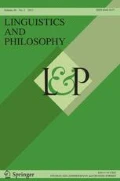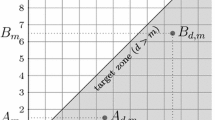Abstract
In this paper, I take issue with an idea that has emerged from recent relativist proposals, and, in particular, from Lasersohn (Linguistics and Philosophy 28: 643–686, 2005), according to which the correct semantics for taste predicates must use contents that are functions of a judge parameter (in addition to a possible world parameter) rather than implicit arguments lexically associated with such predicates. I argue that the relativist account and the contextualist implicit argument-account are, from the viewpoint of semantics, not much more than notational variants of one another. In other words, given any sentence containing a taste predicate, and given any assignment of values to the relevant parameters, the two accounts predict the same truth value and are, in that sense, equivalent. I also look at possible reasons for preferring one account over the other. The phenomenon of “faultless disagreement” (cf. Kölbel, Truth without objectivity, 2002) is often believed to be one such reason. I argue, against Kölbel and Lasersohn, that disagreement is never faultless: either the two parties genuinely disagree, hence if the one is right then the other is wrong, or the two parties are both right, but their apparent disagreement boils down to a misunderstanding. What is more, even if there were faultless disagreement, I argue that relativism would fail to account for it. The upshot of my paper, then, is to show that there is not much disagreement between a contextualist account that models the judge parameter as an implicit argument to the taste predicate, and a relativist account that models it as a parameter of the circumstances of evaluation. The choice between the two accounts, at least when talking about taste, is thus, to a large extent, a matter of taste.
Similar content being viewed by others
References
Condoravdi, C., & Gawron, J.-M. (1996). The context-dependency of implicit arguments. In M. Kanazawa et al. (Eds.), Quantifiers, deduction and context (pp. 3–27). CSLI Publications.
Donnellan K. (1966). Reference and definite descriptions. Philosophical Review 75: 281–303
Glanzberg M. (2007). Context, content and relativism. Philosophical Studies 132: 1–16
Kaplan, D. (1989). Demonstratives. In J. Almog et al. (Eds.), Themes from Kaplan (pp. 581–563). Oxford University Press.
Kölbel, M. (2002). Truth without objectivity. Routledge.
Lasersohn P. (2005). Context dependence, disagreement and predicates of personal taste. Linguistics and Philosophy 28: 643–686
MacFarlane J. (2007). Relativism and disagreement. Philosophical Studies 132: 17–32
Partee B. (1989). Binding implicit variables in quantified contexts. Papers of Chicago Linguistic Society 25: 342–365
Predelli S. (2005a). Contexts. Meaning, truth and the use of language. Oxford University Press, Oxford
Predelli S. (2005b). Painted leaves, context and semantic analysis. Linguistics and Philosophy 28: 351–374
Stephenson T. (2007). Judge dependence, epistemic modals and predicates of personal taste. Linguistics and Philosophy 30: 487–525
Stojanovic, I. (2006). What is said, linguistic meaning, and directly referential expressions. Philosophy Compass 1, http://www.blackwell-compass.com/subject/philosophy/.
Stojanovic, I. (2007). What is said. An inquiry into reference, meaning, and content. PhD Dissertation, Stanford University.
van Benthem J. (1983). Modal logic and classical logic. Bibliopolis, Naples
Author information
Authors and Affiliations
Corresponding author
Additional information
This paper grew out of an email correspondence with Peter Lasersohn in the Fall of 2004 concerning his by now well-known paper. Earlier drafts of the present paper were presented at the workshop “Relativizing Utterance Truth” (Barcelona, September 2005) and at the IPrA panel on semantic relativism (Göteborg, July 2007). I am thankful to both audiences for discussion. I would also like to thank Julien Dutant, Pauline Jacobson, John MacFarlane, Stefano Predelli, Dan Zeman, and an anonymous referee for L&P, for discussion and comments on earlier drafts.
Rights and permissions
About this article
Cite this article
Stojanovic, I. Talking about taste: disagreement, implicit arguments, and relative truth. Linguist and Philos 30, 691–706 (2007). https://doi.org/10.1007/s10988-008-9030-5
Received:
Accepted:
Published:
Issue Date:
DOI: https://doi.org/10.1007/s10988-008-9030-5



